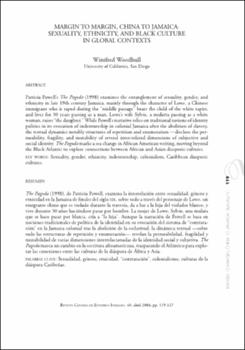Margin to Margin, China to Jamaica: Sexuality, Ethnicity, and Black Culture in Global Contexts
Autor
Woodhull, WinifredFecha
2004Resumen
The Pagoda (1998), de Patricia Powell, examina la interrelación entre sexualidad, género y
etnicidad en la Jamaica de finales del siglo XIX, sobre todo a través del personaje de Lowe, un
emigrante chino que es violado durante la travesía, da a luz a la hija del violador blanco, y
vive durante 30 años haciéndose pasar por hombre. La mujer de Lowe, Sylvie, una mulata
que se hace pasar por blanca, cría a “la hija”. Aunque la narración de Powell se basa en
nociones tradicionales de política de la identidad en su evocación del sistema de “contratación”
en la Jamaica colonial tras la abolición de la esclavitud, la dinámica textual —sobre
todo las estructuras de repetición y enumeración— revelan la permeabilidad, fragilidad y
mutabilidad de varias dimensiones interrelacionadas de la identidad social y subjetiva. The
Pagoda marca un cambio en la escritura afroamericana, traspasando el Atlántico para explorar
las conexiones entre las culturas de la diáspora de África y Asia. Patricia Powell’s The Pagoda (1998) examines the entanglement of sexuality, gender, and
ethnicity in late 19th century Jamaica, mainly through the character of Lowe, a Chinese
immigrant who is raped during the “middle passage” bears the child of the white rapist,
and lives for 30 years passing as a man. Lowe’s wife Sylvie, a mulatta passing as a white
woman, raises “the daughter.” While Powell’s narrative relies on traditional notions of identity
politics in its evocation of indentureship in colonial Jamaica after the abolition of slavery,
the textual dynamics notably structures of repetition and enumeration —disclose the permeability,
fragility, and mutability of several inter-related dimensions of subjective and
social identity. The Pagoda marks a sea change in African American writing, moving beyond
the Black Atlantic to explore connections between African and Asian diasporic cultures.





